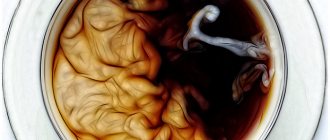An allergy to coffee is a fairly common reaction that can occur even in a completely healthy person. Personal intolerance to any product or allergy is the scourge of our time. More than 35% of the world's population has already faced a similar problem.
Coffee, like any other food product, can cause allergies. Sensitivity to it has unique manifestations and treatment methods. Everyone who treats themselves to a drink should know about them.
What is an allergy
Allergies are commonly called hypersensitive reactions of the body to certain types of pathogens, which are called “allergens.”
Normally, the immune system produces antibodies to fight parasites, bacteria and harmful viruses. This is necessary to ensure a protective function. In case of failures, the body begins to produce antibodies and when allergens enter it, which leads to the release of mediators (one of them is histamine). As a result, rashes and spots appear on the hands, face or other parts of the body, and other signs of allergies are observed, such as frequent sneezing, nasal congestion, swelling, lacrimation, redness and itching in the eyes, gastrointestinal disorders and others.
The appearance of such a reaction can be triggered by the consumption of certain foods, chemicals, plant pollen, animal hair, contact allergens (jewelry, perfume) and so on. The most common one is food allergy.
Classification of food allergens
People with food sensitivities feel justifiably concerned about what they can eat if they have an allergy. It is important to know about foods that often provoke allergic reactions and should be excluded from the diet. For the convenience of specialists in the field of allergy pathology and allergy sufferers, a classification of products positioned as potential allergens has been developed. They can be divided into groups:
- provocateurs of plant origin;
- provocateurs of animal origin.
Among plant antigens, the most significant are pollen (for example, birch pollen, ragweed), as well as allergens contained in vegetables and fruits. Plant components often provoke cross-reactions with latex and animal hair.
Animal allergens are quite numerous. Very often, chicken eggs cause allergies; when sensitized to the protein of which, sensitivity is also observed to the eggs of other birds, chicken meat, and bird feathers. A pork allergy can be combined with a reaction to pet dander. One possible combination is also a house dust mite allergy and a shellfish allergy.
The allergenic properties of food antigens can change during food processing.
This means the likelihood of strengthening or, conversely, weakening the allergenic activity of the food provocateur. An example is the increase in the allergenic potential of peanuts when cooked by any method. At the same time, it is better for allergy sufferers to avoid any allergen product, since it is impossible to predict the severity of the reaction in advance. You should eat only suitable food.
Can you be allergic to coffee?
In the modern world, many cannot even imagine their life without coffee. This drink perfectly invigorates and gives energy, and for people suffering from low blood pressure, it is a kind of panacea. However, there is an allergy to coffee, during which its consumption leads to unpleasant symptoms. Most often this occurs in those people who drink the drink in excessive quantities.
Let us dwell on the questions of how an allergy to coffee manifests itself, why this happens, and whether there are ways to combat such a nuisance.
How is the disease diagnosed?
Not many people know how a coffee allergy manifests itself. But you have a rapid heartbeat, severe chills, migraine (signs of a severe form of the disease), you should not self-medicate.
First of all, it is necessary to understand what caused the appearance of such symptoms. Caffeine intolerance can only be determined after certain diagnostic procedures are performed.
At home, it is recommended to first describe how you feel after eating a particular product. You can conduct an experiment: drink a cup of coffee and, if you feel unwell, drink, for example, activated carbon (per 10 kg of body weight - 1 tablet; for example, if the patient weighs 70 kg, he needs to drink 7 tablets).
Article on the topic: Respiratory allergosis: symptoms, treatment and prevention
If it feels better, it means that the same tonic drink is causing an allergy. The next step is to exclude from your daily diet a product that is an allergen and causes you to feel unwell. Still, it is better to seek help from an allergist.
He will prescribe the following diagnostic procedures:
- skin test;
- hair analysis;
- blood analysis;
- bioenergy diagnostics.
We will tell you in detail what these procedures are.
Caffeine intolerance
Skin test to detect coffee allergy
To diagnose the disease, a small amount of allergen is injected under the skin. If the patient does have caffeine intolerance, allergy symptoms will appear almost immediately.
You can fight the allergen using the method of enzymatic desensitization (it allows you to reduce the body’s sensitivity to the specified substance). This method helps even when others are ineffective.
Skin test to detect coffee allergy
Hair analysis to detect allergies
In order to detect an allergy to an invigorating drink, a specialist takes the patient’s hair and adds antibodies. Then, under a microscope or using a computer examination, he monitors what will happen next.
If there is a reaction, there is also an allergy to coffee.
Hair analysis to detect coffee allergy
Blood analysis
This process is quite complex. It is based on identifying competition between special antibodies and the patient's own antibodies.
In order to detect an allergy to coffee, a specialist mixes blood serum with a laboratory solution and places it in a special apparatus.
If an allergic reaction occurs, the device will detect a glowing dye that will join the blood serum.
Blood test to detect coffee allergy
Bioenergy technique
To carry out this procedure, special bioresonance computers are used. They record changes in the electromagnetic field in the human body that occur as a reaction to allergens in food.
The patient is connected to this computer, a weak electromagnetic field is created, and the device records the processes occurring.
Bioenergetic technique for identifying allergens
Causes of coffee allergies
It’s worth starting with the fact that an allergy to coffee can manifest itself in both types: instant and natural. In the first case, this will be due to the presence of various additives and colorings in the drink. This means that the body’s reaction occurs not to the drink as a whole, but to its individual components.
In the case of natural coffee, chlorogenic acid, which is contained in the beans, can trigger allergies. This happens due to individual intolerance of the body.
An adverse reaction to caffeine, which is present in large quantities in the drink, may also occur.
It is important to remember one detail: coffee allergies do not appear suddenly. This happens only if there are accompanying factors that lead to an aggravation of the situation. These include:
- diseases of the gastrointestinal tract;
- metabolic problems;
- diseases of the liver and other organs that act as filters;
- kidney and pancreas diseases;
- disturbances in the functioning of the immune system.
Therefore, if it is confirmed that the allergic reaction was caused precisely by drinking coffee, it would be a good idea to undergo a medical examination. This will help identify and eliminate possible problems in a timely manner. And along with them, allergies to your favorite aromatic drink will disappear.
Is it possible to drink coffee with VSD (vegetative-vascular dystonia)?
The caffeine contained in coffee has a certain effect on the autonomic nervous system. Especially in the department of nervous excitement and wakefulness. This is why if you drink coffee before bed, insomnia occurs. In a person with VSD, the patterns of sleep and wakefulness, inhibition and arousal manifest themselves inadequately. Coffee, in turn, leads to an even greater imbalance in the functioning of the nervous system.
Caffeine also stimulates the release of a hormone that causes anxiety. That is why a person who does not know how to act when fear or anxiety arises should not drink coffee. But if the patient has learned to control these conditions, then there is no need to refuse a cup of aromatic drink.
If after drinking coffee a person experiences dizziness, rapid heartbeat, nervous tension or anxiety, they should stop drinking it.
Most often, nausea, weakness and dizziness during menstruation occur due to low blood pressure. Everyone knows that coffee tends to increase it, which is good. But you should take into account another ability of coffee - retaining fluid in the body. This can lead to, no less pleasant, abdominal pain. During menstruation, a girl's mood is extremely changeable, emotions are stronger, and nerves are weaker. Coffee can only make the situation worse.
Considering all the effects on the body, we can say that drinking coffee during menstruation is not advisable. A chicory drink or plain water will be much more beneficial.
Allergic diseases include various serious abnormal conditions: anaphylactic shock, Quincke's edema, bronchial asthma and many other life-threatening conditions. During an exacerbation of allergic diseases, many foods must be abandoned. Coffee was also banned. It is better to replace it with various healthy decoctions.
Coffee and tea are considered the most common, popular and quite tasty drinks. We are used to drinking coffee in the morning, energizing us for the whole day. In the evening, when coming home to relax, most of us brew a mug of tea and enjoy this unique taste. And, did you know that it is possible that you will be allergic to tea or coffee? Do you think this is possible or not?
Since coffee is a food product, it can therefore be called a food allergen. Most often, a person has an allergic reaction to food. Moreover, if you are allergic to citrus fruits, this seems to be an obvious fact. And to prevent such a negative food (allergic) reaction from happening, you just need to eat less oranges. But what about coffee? After all, many of us drink several glasses of it during the working day and do not think about any allergy to this drink.
Moreover, we can immediately say that for a real coffee lover, giving up coffee is akin to the death penalty or a sentence. To avoid a food reaction to coffee, you need to give it up.
Coffee contains a substance that few people know about. This is chlorogenic acid. doctors note that when it comes to the occurrence of a negative food reaction to coffee, it is this acid that provokes it.
Provoking factors for an allergy to coffee will be:
- Decreased immunity;
- Disruption of the gastrointestinal tract;
- Inflammatory processes in the liver;
- Kidney diseases;
- Diseases of the pancreas.
The most important trigger for a coffee allergy is drinking this drink in large quantities. A large amount means 2-3 cups of coffee per day or more. How many cups of coffee do you drink a day?
Important!
Coffee is a very highly concentrated, rich drink, which in large quantities can do more harm to the human body than good.
It is strictly forbidden to drink coffee for people with cardiovascular diseases, as well as disorders of the gastrointestinal tract. Coffee increases the risk of exacerbation of these diseases.
Statistics!
Most often, coffee allergies occur in those who suffer from other food allergies - chocolate, cocoa, tea. Doctors recommend not to overuse these products.
How does a coffee allergy manifest itself? By what symptoms can you understand that this is the mug of coffee you need to stop at?
So, if you experience numerous skin reactions in the form of a rash, red dots and spots on the face, redness of some areas of the skin, then you no longer need to drink coffee. More severe symptoms of an allergic reaction to coffee may include shortness of breath, severe coughing, and persistent sneezing. From the gastrointestinal tract, allergies manifest themselves in the form of vomiting, diarrhea, flatulence, hiccups, and stomach pain. From the cardiovascular system: heart pain, palpitations, headache.
Moreover, not everyone can associate all these symptoms with a reaction to coffee. Even doctors do not always determine that increased heart rate, flatulence, headaches, and rashes on the body are a signal that you still need to stop drinking coffee.
If you feel unwell after drinking a cup of coffee, then give up this drink for a while. If you feel better (without coffee in your diet), you should think about its further use.
Worth knowing!
Allergies to natural ground and instant coffee are identical in their symptoms. This means that you shouldn’t think, “I’ll switch to instant coffee if I have a negative allergic reaction to natural coffee.”
An allergic reaction to instant coffee can be even stronger than to regular ground coffee. Instant coffee contains even more allergens - flavors, dyes, flavor additives, chemicals, food additives, and also a small amount of caffeine. Moreover, if caffeine from ground natural coffee is absorbed quite well and has an energetic effect on the body, then instant coffee lingers in the gastrointestinal tract for a long time. The specific composition of instant coffee ensures that all harmful substances from this drink gradually accumulate in the body.
Even if you replace instant coffee with decaffeinated coffee, it still won’t solve the problem.
Decaffeinated coffee increases the risk of gallstones.
An allergic reaction to coffee is treated with antihistamines. Allergy sufferers should always keep Suprastin tablets with them at a dosage of 25 mg. It is recommended to take them 3-4 times a day. If the patient’s condition rapidly deteriorates, then the dosage is increased, but only after consulting a doctor. If the gastrointestinal tract has a negative reaction to coffee, you need to drink a course of sorbent - activated carbon.
The only way to prevent an allergy to coffee is to drink it, but in a minimal dosage. Just one cup of coffee in the morning is enough to charge your body with vigor and energy, without provoking an allergic reaction.
If we are talking about an allergy to tea, then it would be more correct to say that a person has a negative food reaction not to the tea itself, but to its components. These can be flavoring additives, dyes, aromatic substances, herbs, which are present in almost every tea on store shelves. Also, when choosing tea, it is very important to pay attention to its expiration date.
Did you know that expired tea may contain a fungus that can cause a negative allergic reaction.
To avoid an allergy to tea, you must choose only a drink that is 100% natural tea leaves, without additives, dyes, flavors, and also corresponds to the expiration date.
The main way to prevent allergies is to avoid drinking the drink. Moreover, in addition to coffee, it is also important to exclude products containing caffeine.
Chicory also contains allergenic substances. Chocolate must be replaced with cocoa-free products. You should always take with you medications that can relieve the symptoms of the disease.
Coffee allergies are rare and treatable.
It is important to pay attention to the symptoms in time, identify the exact allergen and eliminate the consequences. In the future, the diet must be adjusted in order to prevent recurrent manifestations of allergies.
Some components that make up caffeine (usually chlorogenic acid) can cause an intolerance reaction, which provokes the appearance of the first symptoms of a coffee allergy. This pathology occurs against the background of reduced immunity, problems with the kidneys and liver, disorders of the gastrointestinal tract and pancreas.
The main reason for the development of an allergic reaction to coffee is its excessive consumption. In this case, patients will also have an intolerance to cocoa, tea, carbonated drinks and chocolate.
The first signs of the disease
The symptoms that occur during an allergic reaction to coffee are similar to those of other types of allergies:
Red rashes appear on the surface of the skin, characterized by unbearable itching and burning, hives and pimples appear. Rashes can occur on the hands and face, and in rare cases they can spread to the entire body.
- 2. Bloating, diarrhea, hiccups and attacks of nausea appear.
- 3. There is a strong cough, almost continuous sneezing, and the breathing process becomes difficult.
- tachycardia;
- severe chills;
- unbearable migraine attack.
In addition to the listed main symptoms of the disease, if you are allergic to this instant drink, the following occurs:
Often, an allergy to coffee manifests itself in the fact that patients have a rise in temperature and often have a fever.
Intolerance to coffee beans in children can also provoke the development of pathological conditions in the functioning of the heart, pericardial vessels and cause pulmonary edema.
An allergic reaction is triggered not by drinking coffee, but by its smell.
As soon as it reaches the allergy sufferer, the person begins to sneeze and cough uncontrollably, making breathing much more difficult. As soon as such symptoms appear, it is important to immediately contact an allergist, since otherwise the disease may develop into an advanced stage, after which treatment will take more time and effort.
Recently, cosmetics (various scrubs and creams) based on caffeine have become very popular.
The likelihood of an allergy occurring when using products containing caffeine topically is low, but with constant consumption, signs of cumulative allergies may begin, so before use it is important to test the tolerance of a particular cosmetic product.
In order to determine whether a person really has an allergy to coffee, the doctor prescribes a series of laboratory diagnostic tests that make it possible to accurately determine the cause of the allergy. These include:
- introduction of allergy tests;
- carrying out computer diagnostics;
- hair research in laboratory conditions;
- blood sampling to detect immunoglobulin.
The procedure for subcutaneous allergy testing involves scratching the skin in the wrist area with a special instrument, after which specialists drop a small amount of the potential allergen onto the damaged surface of the skin.
Then, in a hospital setting, careful monitoring of the patient’s reaction is carried out.
Also, in laboratory research, doctors collect hair and mix it with a small amount of immunoglobulin in order to observe a possible reaction using a microscope.
Coffee allergy therapy
This type of allergy in adults cannot be completely eliminated, but taking antihistamines as part of complex treatment will help relieve the symptoms of the disease and avoid further relapses for a long time.
Drug therapy includes the same drugs that are used to treat food allergies.
In most cases, patients are prescribed to take Suprastin one tablet once a day. In the absence of side effects, it is possible to increase the daily dose, but not more than 2 mg per kilogram of body weight.
Expectorants for the treatment of dry cough in children and adults
Allergies to coffee are very rare. Many people don’t even know if they are allergic to this product. However, a negative reaction of the body to this drink can appear quite unexpectedly, at any moment in life.
The only way to escape from such an allergy, in this case, is to completely give up coffee.
Scientists have noted the fact that an allergy to coffee is accompanied by an allergy to legumes, so you should monitor the body's reaction after consuming this product. Being prone to allergic manifestations, you should always have antihistamines with you to relieve symptoms of illness if you accidentally consume an allergenic product.
You can drink green coffee instead of regular coffee; it contains less caffeine, but there is several times more chlorogenic acid.
Therefore, when replacing a drink, it is worth monitoring the body’s reaction. Also, do not forget that chicory can be an alternative.
Allergic reactions to drinks made from coffee beans are quite common. But sometimes a person cannot tolerate only ground freshly brewed coffee, but drinks instant coffee without harm to health. This raises doubts about why this happens and whether there can be an allergy to coffee made from beans, but not to powdered or granulated coffee.
Coffee beans contain more different biologically active substances, but allergies often arise not even to caffeine, but to additives that manufacturers use to improve and enhance the taste of the drink.
If an allergy has developed to caffeine, then natural ground coffee will also cause an allergy.
But if an allergic reaction occurs to flavorings, then you can drink natural coffee. Although it’s better not to do this.
The risk of angioedema or anaphylactic shock increases due to the body's sensitization (susceptibility to an allergic response), even if the allergy is not caused by a reaction to caffeine.
"And you Brute!" What other words can a person express his misfortune when he is convinced that his allergy is caused by coffee - the drink with which he begins every morning.
According to experts, giving up this product is much more difficult for most people than giving up oranges, strawberries or chocolate.
In the last article we wrote about whether there can be an allergy to tea at this link.
Is coffee an allergen?
How I would like to hear a negative answer! However, having thoroughly studied the chemical composition, scientists confirmed the presence of allergens in the product such as chlorogenic acid, tannin, and, of course, caffeine.
Allergic manifestations can be both spontaneous and permanent. Chlorogenic acid is especially active in this regard (it is also found in eggplants, sorrel, blueberries, and sunflower seeds).
In small quantities, acid is even beneficial for the body - it helps remove toxins, strengthens bones and muscle tissue.
However, abuse of this substance is dangerous: the medicinal properties are lost, and the risk of allergies increases.
According to experts, the causes of allergic manifestations lie not so much in the product itself, but in the state of human health.
Provoking factors may be:
- weakened immune system;
- diseases of the gastrointestinal tract;
- disruptions in the functioning of the urinary system.
A separate important topic is the menu for women who have an infant.
A baby whose mother was unable to give up coffee will suffer from caffeine, since his developing body is not able to remove it.
Post Views: 157
Signs of a coffee allergy
What special signs are accompanied by a coffee allergy? Symptoms can vary.
The main ones are exactly the same as during allergic reactions to any other product: rashes, redness and spots on the hands, face or other parts of the body, itching, hives. In addition, cough and shortness of breath, nasal congestion, and repeated sneezing may occur. There may be malfunctions in the digestive system, which will be accompanied by abdominal pain, diarrhea, vomiting, and flatulence.
In a severe form, an allergy to coffee may be accompanied by chills, headaches, increased heart rate, suffocation, and Quincke's edema.
Symptoms of Excessive Caffeine vs Allergy Symptoms
The recommended caffeine intake for adults is limited to 400 milligrams (mg) per day. This is approximately 4 small cups of homemade coffee. If this amount is exceeded, many people may experience unpleasant symptoms.
People who do not regularly drink caffeine, or those who are sensitive to it, may experience symptoms even after relatively small amounts of caffeine contained in a single cup of coffee or tea.
In a person who is not accustomed to caffeine-containing drinks, the reaction occurs due to the fact that the body, not adapted to the effects of the alkaloid, tries to process it and remove it from the body.
Drinking excessive amounts of caffeine causes symptoms similar to those of intolerance.
In addition, large amounts of caffeine cause in those sensitive to it:
- chest pain;
- cardiopalmus;
- numbness of the limbs;
- muscle pain;
- shortness of breath;
- headaches or migraines;
- delusions or hallucinations;
- cold sweat;
- flu-like symptoms;
- mood swings, anger or depression;
- panic attacks.
Diagnosis of allergies
To confirm the diagnosis, you must contact an allergy center. In laboratory conditions, it will be possible to determine its nature and establish the fact that the body’s reaction was caused specifically by food products. But it will take some time to identify the real culprits.
The first thing you need to do is reduce the number of foods you eat. This will help identify the cause of the allergy as soon as possible. Employees who work in an organization such as an allergy center are advised to start keeping a food diary. It is necessary to include all the foods that were eaten. This must be done every day, indicating absolutely all food.
If it is determined that the allergy that has arisen is to coffee, it is necessary to conduct a final test. To do this, drink a cup of drink and take an antihistamine. If you have an allergy, the symptoms will soon disappear and your condition will improve.
Treatment with folk remedies
Relief from coffee allergy symptoms is also carried out using alternative treatment. Traditional healers consider mumiyo to be a very good way to get rid of allergies. It is diluted in a ratio of one gram of product per liter of water and taken one hundred milliliters every day.
A decoction of the string helps relieve allergic symptoms. It must be taken for a long time, brewed like a tea drink. The drug is infused for about thirty minutes.
Celandine tincture helps overcome the disease. They drink it one glass a day, brewing a teaspoon of the plant in four hundred grams of boiling water. Infuse the herb for several hours. The procedure is carried out in courses.
An infusion of meadowsweet or spirea can also be used in the complex treatment of coffee allergies. Prepare it as follows. Thirty grams of dry raw materials are poured with half a liter of boiling water and left for half an hour. Then filter and take one tablespoon before meals. The course of treatment is carried out intermittently (3-4 days), lasting up to three months.
What is the conclusion from all that has been said? To prevent your health from failing in the future, you need to exclude coffee from your daily menu and find an alternative replacement for it.
Rate this article
votes, rating:
out of 5)
If you find an error in the text, be sure to let us know about it. To do this, simply highlight the text with the error and press Shift + Enter or simply click here . Thank you very much!
Thank you for notifying us about the error. We will fix everything soon and the site will become even better!
Often illnesses and illnesses take a person by surprise and it is always difficult to change your usual lifestyle. Scientists have long proven that coffee is a kind of addictive drug. But what to do if a person has VSD or allergies? What to do if you start menstruating, can you drink coffee? You will learn about this from this article.
What else will you have to give up?
If you are allergic to natural coffee, you will have to limit the consumption of other products that contain chlorogenic acid. These are apples, blueberries, eggplants, barberries, sorrel, sunflower seeds, potatoes. It is worth considering that chlorogenic acid itself is not a dangerous substance. An individual reaction of the body usually occurs as a result of excessive consumption of it.
Caffeine is present in greater or lesser quantities in dark ice cream, analgesics, diet pills, energy drinks, soft cocktails, chocolate, Coca-Cola, and cocoa.
It is also important to consider that there is a relationship between two types of allergies: coffee and legumes. Therefore, the latter should be abandoned at least for the duration of treatment. This is especially true for green peas and beans.
In addition, meat purines and tobacco smoke, the composition of which is similar to caffeine, are prohibited.
How to treat and who will help?
After identifying the substance, you should definitely contact an allergist, who, after research, will prescribe adequate treatment.
Treatment methods:
- Taking antihistamines will relieve symptoms. They must be taken strictly in accordance with your doctor's prescription.
- Immunotherapy in most cases cures the disease itself. To do this, caffeine is injected under the patient's skin in small quantities. When the immune reaction becomes less obvious, the dose is increased.
- Among the traditional methods of treatment, it is worth highlighting the use of a decoction of string and celandine for several years.
There are various antihistamines and only a doctor has the right to prescribe them. The first generation drugs cause drowsiness, the third generation has fewer side effects, and they act selectively.
Treatment of allergy to coffee
The first stage of treatment involves eliminating the allergen from the diet, in this case coffee. To quickly eliminate unpleasant symptoms, a course of antihistamines is prescribed, and external signs such as rashes, skin peeling, and redness are treated with special ointments and gels.
To remove allergic substances from the body, it is usually recommended to take sorbents. This will also reduce the body's reaction to hot coffee if a person still cannot refuse it. In parallel with sorbents, it is advisable to start taking medications that eliminate the development of dysbacteriosis.
If an allergy to coffee provokes disruptions in the digestive system, then the use of enzymes that improve the functioning of the gastrointestinal tract is prescribed as symptomatic therapy.
It is important to remember that allergies cannot be cured. Therefore, the only way to avoid it in the future is to follow certain rules.
Classification of products according to their ability to cause allergies
It is especially important for people with food allergies to monitor their diet. The disease is caused by undigested proteins that enter the bloodstream and settle on the tissues of the body, causing allergies. These uncleaved proteins are not formed from every food. Therefore, allergists and nutritionists have developed a special classification that helps a person with allergies understand the question of what can and cannot be eaten with such an illness.
The classification includes three types of food products:
- highly allergenic;
- moderately allergenic;
- low-allergenic.
Knowing the features of this classification, an allergy sufferer can easily create their own diet without constantly resorting to the help of allergists and nutritionists.
What will not cause an allergic reaction?
A person with allergies can consume low-allergenic foods without fear. If they are grown and produced in the right conditions, the plants have not been treated with nitrates, and the animals have not been fed harmful substances, then a pathological reaction will not develop. Therefore, if you have allergies, you can eat and drink the following foods:
- kefir and other fermented milk;
- lean meats and fish;
- fresh vegetables (except tomatoes) and herbs;
- yellow and green fruits (pears, cherries, apples, white currants, gooseberries);
- prunes, dried fruits from apples and pears;
- weak tea, rosehip infusion, decoctions of green vegetables and fruits;
- porridge (semolina, pearl barley, oatmeal and others, except buckwheat and wheat).
The abundance of vegetables in the diet reduces the likelihood of developing an allergic reaction. However, it is important to choose only those vegetables that are typical for your region at this time of year. By purchasing cucumbers in winter, a person receives a lot of nitrates and further increases the sensitivity of the immune system.
Foods are allergy friends
If you have allergies, be sure to exclude highly allergenic foods from your diet. Even without an exacerbation, they can worsen the condition and cause symptoms of illness. And in combination with other allergens they can seriously affect health. Highly allergenic products include:
- whole milk;
- red vegetables and fruits, citrus fruits;
- nuts and honey;
- carbonated drinks, coffee, cocoa;
- chocolate and other sweets;
- pickles and sour foods;
- hot seasonings, sauces and marinades.
Alcohol is also one of the strongest allergens. The consumption of alcoholic beverages should be limited in any case, and if a person takes anti-allergy medications, then alcohol should be excluded altogether.
Eggs are also highly allergenic foods, but you can’t completely remove them from your diet. You should alternate eggs with other protein foods (fish, meat) in order to ensure sufficient protein intake in the body. However, it is not recommended to eat more than two eggs per day.
Moderately allergenic products
Moderately allergenic products can cause an allergic reaction to a lesser extent than highly allergenic ones. Therefore, it is advisable to limit their use. You should avoid them altogether only if you are sure that a certain product causes a reaction in you.
These include:
- bananas, apricots, peaches;
- red berries;
- some vegetables (sweet peppers, potatoes);
- peas and legumes;
- herbal infusions and decoctions;
- fat meat.
Preventing coffee allergies
The main and most effective way to prevent an allergy to coffee is to completely exclude it from your diet. Although in this regard it is necessary to take into account the individual characteristics of the body. For example, if some people experience a reaction after the first sip of the drink, others can afford to drink one or two cups without any visible consequences. The main thing in the second case is not to overdo it, since the reaction occurs as a result of an overdose of allergens. Therefore, it is worth limiting the consumption of the drink to a minimum.
Prevention methods can also include conducting a full examination of the body to identify diseases of the kidneys, liver, gastrointestinal tract, and so on. This has already been mentioned above, so we will not repeat it.
Another point concerns the so-called green coffee, which contains small doses of tannins and caffeine. Despite the safety of the drink, which is stated in the advertisement, it remains prohibited for allergy sufferers. This is due to the high concentration of chlorogenic acid in it.
Recommended (subject to individual tolerance):
– cereals (except semolina); – fermented milk products (kefir, biokefir, yoghurts without fruit additives, etc.); – mild varieties of cheese; – lean meat (beef, pork, rabbit, turkey), specialized canned meat for baby food; – all types of cabbage, zucchini, squash, light pumpkin, parsley, dill, young green peas, green beans; – green and white apples, pears, light varieties of cherries and plums, white and red currants, gooseberries; – melted butter, refined deodorized vegetable oil (corn, sunflower, olive, etc.); – fructose; – second grade wheat bread, grain crispbread, unsweetened corn toffee sticks and flakes. This diet is prescribed for exacerbations of allergic diseases for 7-10 days, then, in accordance with the doctor’s recommendations, you can slowly switch to an individual hypoallergenic diet (a diet that excludes specific foods that are allergens for a particular patient).
In conclusion, I would like to ask all allergy sufferers not to treat diet as torture. Remember that by following dietary recommendations, you give yourself the opportunity to live a healthy and fulfilling life despite the presence of an allergic disease.
Often illnesses and illnesses take a person by surprise and it is always difficult to change your usual lifestyle. Scientists have long proven that coffee is a kind of addictive drug. But what to do if a person has VSD or allergies? What to do if you start menstruating, can you drink coffee? You will learn about this from this article.
How to replace your favorite invigorating drink?
This question remains open for those who are used to waking up only thanks to coffee. But, as we know, nothing is irreplaceable. For example, freshly squeezed orange juice or green tea can give you vigor and energy. If you are not allergic to caffeine, you can replace it with hot chocolate.
For those who cannot refuse the taste of coffee, modern manufacturers offer the option of a caffeine-free drink (although it is contained there, but in very small doses) or chicory root.
Another great way to help you finally wake up and cheer up is to take a contrast shower. Among other things, this procedure is very useful for any person.
Although coffee allergies are quite rare, this does not make the symptoms any less unpleasant. Therefore, it is important to recognize it in time and give up your favorite drink or replace it with something similar.
Be healthy!
Prevention
In the case where caffeine is a known allergen, a person can experiment with different types of drink that do not contain this substance. A popular substitute is chicory, which has a positive effect on the body as a whole, and, moreover, is much cheaper.
If the allergen is a dairy product, then the solution to the problem is to refuse cappuccino or latte and choose black coffee without additives.
Whipped mousses and various toppings used to decorate coffee may contain eggs or nuts, which are also possible allergens.
It is worth noting that if a person is intolerant to coffee, a person should be careful with the consumption of carbonated and energy drinks, green tea, chocolate and cocoa, legumes - a cross-allergic reaction is possible. Green coffee also causes allergies and is prohibited for consumption.
Recommendations include: quitting smoking, excessive meat consumption, a balanced diet (especially when breastfeeding) and a healthy lifestyle to avoid health problems in the future.
Children should avoid drinking coffee until at least 14 years of age. It is better to replace it with freshly squeezed juice or everyone’s favorite tea.











